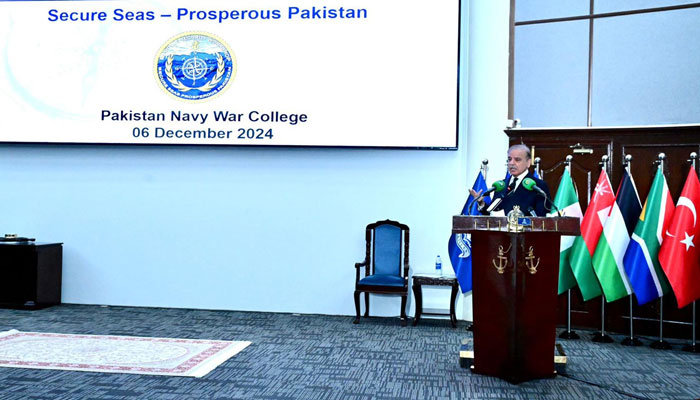China to help Pakistan in blue economy: PM
PM Shehbaz praises dedication and professionalism of Navy’s personnel in protecting maritime boundaries
LAHORE: Prime Minister Shehbaz Sharif on Friday said that China will help Pakistan in blue economy, adding that Beijing will send a team to explore the natural resources under the Pakistani sea.
Addressing the closing session of the 7th National Maritime Security Workshop (MARSEW) at the Navy War College in Lahore as a chief guest, the prime minister lauded the Pakistan Navy’s unwavering commitment to contribute to the development of the country and its significant role to the national security, saying that the Navy was fully prepared to ensure the defence of the maritime boundaries of the country.
The premier emphasised the strategic importance of maritime security and the blue economy, commending the Navy’s exceptional capabilities in addressing diverse challenges. He praised the dedication and professionalism of the Navy’s officers and personnel in protecting the country’s maritime boundaries.
“The blue economy holds central importance in today’s world,” he remarked, highlighting Pakistan Navy’s proactive measures to harness maritime resources for the nation’s development. He also acknowledged China as a vital partner, expressing gratitude for its steadfast cooperation in the maritime domain.
Shehbaz underscored the critical link between economic prosperity and the efficient utilisation of the blue economy, saying that Gwadar Port was considered a cornerstone of Pakistan’s economic future due to its strategic location, economic potential, and its role in the development of regional trade and connectivity. He expressed government’s firm resolve to eliminate terrorism from all over Pakistan as it did in 2018. He paid rich tribute to the martyrs of the armed forces for their great sacrifices during anti-terrorism operations.
He told the participants that Apex Committee meetings were being held regularly aimed to ensuring peace and security in the country. He expressed a strong commitment to leveraging maritime resources for economic progress and enhancing national security.
He termed the role of Gawadar Port very important in the blue economy and it must be prepared to facilitate the importers and exporters. He added that Karachi Port Trust must be equipped with the modern technology to execute the loading and unloading consignments from across the world.
He was of the view that real estate business was not the domain of Port Trust and the professional approach could steer this institution towards its real commercial scope in the blue economy. He highlighted the importance of National Shipping Corporation and vowed to re-establish it in accordance with the commercial needs.
The prime minister said that Pakistan had full of talent and resources, adding that this potential should be utilised to get rid of the debt.
Earlier, the chief guest, upon his arrival at PN War College, was received by Chief of the Naval Staff Admiral Naveed Ashraf.
In his welcome address, Pakistan Navy War College Commandant Rear Admiral Azhar Mahmood provided an overview of workshop’s activities.
Later, a panel of participants presented a paper containing recommendations for a National Maritime Policy. The panel analysed the maritime environment, highlighting its impact on national security and economic prosperity, and proposed measures to address challenges and capitalise on opportunities.
The Maritime Security Workshop was an annual event organised by the Pakistan Navy to enhance understanding of maritime security dynamics, create awareness about blue economy, and explore Pakistan’s untapped maritime potential. Participants included parliamentarians, policymakers, bureaucrats, academics, entrepreneurs, armed forces officers and media representatives.
-
 Nicole Kidman Celebrates Galentine’s Day Months After Keith Urban Split
Nicole Kidman Celebrates Galentine’s Day Months After Keith Urban Split -
 Justin Bieber Unveils Hailey Bieber As First Face Of SKYLRK In Intimate Campaign Debut
Justin Bieber Unveils Hailey Bieber As First Face Of SKYLRK In Intimate Campaign Debut -
 Caitlin O’Connor Says Fiance Joe Manganiello Has Changed Valentine’s Day For Her
Caitlin O’Connor Says Fiance Joe Manganiello Has Changed Valentine’s Day For Her -
 Rachel Zoe Sends Out Message For Womne With Her Post-divorce Diamond Ring
Rachel Zoe Sends Out Message For Womne With Her Post-divorce Diamond Ring -
 James Van Der Beek's Final Conversation With Director Roger Avary Laid Bare: 'We Cried'
James Van Der Beek's Final Conversation With Director Roger Avary Laid Bare: 'We Cried' -
 Jaden Smith Walks Out Of Interview After Kanye West Question At Film Premiere
Jaden Smith Walks Out Of Interview After Kanye West Question At Film Premiere -
 Why Halle Berry Wasn't Ready For Marriage After Van Hunt Popped Question? Source
Why Halle Berry Wasn't Ready For Marriage After Van Hunt Popped Question? Source -
 Michelle Obama Gets Candid About Spontaneous Decision At Piercings Tattoo
Michelle Obama Gets Candid About Spontaneous Decision At Piercings Tattoo -
 Bunnie Xo Shares Raw Confession After Year-long IVF Struggle
Bunnie Xo Shares Raw Confession After Year-long IVF Struggle -
 Brooks Nader Reveals Why She Quit Fillers After Years
Brooks Nader Reveals Why She Quit Fillers After Years -
 Travis Kelce Plays Key Role In Taylor Swift's 'Opalite' Remix
Travis Kelce Plays Key Role In Taylor Swift's 'Opalite' Remix -
 How Jennifer Aniston's 57th Birthday Went With Boyfriend Jim Curtis
How Jennifer Aniston's 57th Birthday Went With Boyfriend Jim Curtis -
 JoJo Siwa Shares Inspiring Words With Young Changemakers
JoJo Siwa Shares Inspiring Words With Young Changemakers -
 James Van Der Beek Loved Ones Breaks Silence After Fundraiser Hits $2.2M
James Van Der Beek Loved Ones Breaks Silence After Fundraiser Hits $2.2M -
 Disney’s $336m 'Snow White' Remake Ends With $170m Box Office Loss: Report
Disney’s $336m 'Snow White' Remake Ends With $170m Box Office Loss: Report -
 Travis Kelce's Mom Donna Kelce Breaks Silence On His Retirement Plans
Travis Kelce's Mom Donna Kelce Breaks Silence On His Retirement Plans




